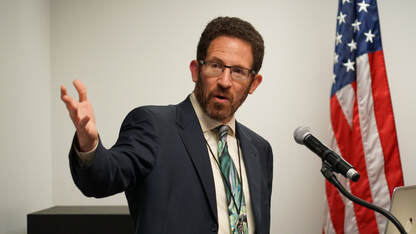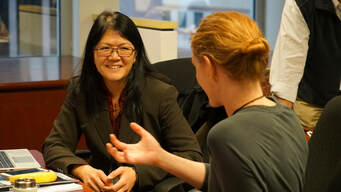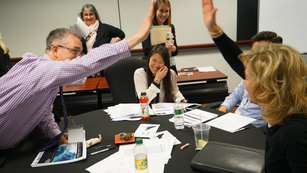 Copyright Gifford Productions https://giffordproductions.com/ Copyright Gifford Productions https://giffordproductions.com/ Please refer to our Conference Hub page through narcad.org for all conference related videos and slides, which are available as of December 2nd, 2019. by Anna Morgan, RN, BSN, MPH, NaRCAD Program Manager Tags: Conference, E-Detailing, Jerry Avorn, Program Management Our team at NaRCAD was proud to host the 7th International Conference on Academic Detailing on November 7th and 8th, 2019 in Boston to a sold-out crowd of health professionals engaged in clinical outreach education. With this year’s theme emphasizing collaboration and innovation, our Director, Dr. Mike Fischer, kicked off Day 1 of NaRCAD2019 by reflecting on the past decade of NaRCAD’s work, while also discussing our exciting plans for the future, and highlighting the importance of enhancing connection between attendees to support their work ahead. Dr. Melissa Christopher, National Director for the Veteran Affairs (VA) Academic Detailing Services, was next to take the stage as the Day 1 Keynote Speaker. She provided the audience with an overview of the current work by the Department of Veterans Affairs National Academic Detailing Service and how it supports a High Reliability Organization culture. She also spoke of the future of academic detailing at the VA, which includes expanding their reach with virtual detailing (“e-detailing”) and advancing their electronic health records through ordering safety alerts and real-time PDMP data.  Copyright Gifford Productions https://giffordproductions.com/ Copyright Gifford Productions https://giffordproductions.com/ Other day 1 highlights included an expert panel presenting on the successes and challenges of implementing e-detailing within their programs, sharing stories and insights about when, why, and how to connect virtually with providers. Our small group breakout sessions explored the fundamentals of academic detailing, with sessions focused on the basics of an academic detailing visit, how to identify and apply the most reliable sources of evidence-based research, and how to successfully lead an academic detailing program. Day 1 also included our annual “lightning round” of Field Presentations, a session that highlights aspects of recent academic detailing interventions. Topics included the use of academic detailing to improve maternal and neonatal health through safer opioid prescribing, the effects of academic detailing on pediatric antipsychotic prescribing in the Medicaid population, and increasing access to Nalaxone in New York City through academic detailing. The afternoon also included a talk on Aetna’s opioid strategy and ongoing initiatives, with a focus on leveraging provider and system relationships to incentivize physician engagement and catalyze behavior change.  Copyright Gifford Productions https://giffordproductions.com/ Copyright Gifford Productions https://giffordproductions.com/ Dr. Jerry Avorn, Co-Director of NaRCAD, ended the Day 1 presentations with his Annual Academic Detailing Talk, addressing the importance of moving beyond the silos that exist in most healthcare settings, and how academic detailing can encourage the integration and collaboration of roles and initiatives to create synergy. That collaboration and synergy was illustrated during our evening’s Networking Reception, where we launched our new Mentor Match Program to great success, pairing those just starting out in the field with mentors who are part of more established programs. Day 2 provided similar opportunity for exploration and dialogue about program expansion. We kicked off with Keynote Speaker Tupper Bean, Executive Director from the Centre for Effective Practice (CEP). He discussed CEP’s journey to sustainability as an independent, not-for-profit organization, and reminded the audience that sustainability is a parallel process, not an “add-on”. To further explore sustainability, our Day 2 Plenary highlighted capacity-building strategies, best practices, and opportunities for expansion in clinical outreach education programming.  Day 2 Field Presentations provided opportunities to learn about more active AD programs, including topics such as identifying barriers to opioid prescribing through academic detailing, a team-based model and approach to AD, and a new AD campaign exploring cannabis as an alternative tool for patients experiencing pain. Our afternoon wrapped up with workshops focused on relationship-building for program sustainability, understanding stigma when supporting patients with opioid use disorder (OUD), and building AD campaign materials with limited resources. We’re grateful to all those who attended, and beyond the 2 days of connection at the conference, we at NaRCAD are committed to creating continuous opportunities for connection, support, and collaboration among all of you who make up our incredible network. Keep an eye out for our Annual Community survey, which we’ll send you in early December to find out what you need as you make an even greater impact in 2020! -The NaRCAD Team Comments are closed.
|
Highlighting Best PracticesWe highlight what's working in clinical education through interviews, features, event recaps, and guest blogs, offering clinical educators the chance to share successes and lessons learned from around the country & beyond. Search Archives
|
